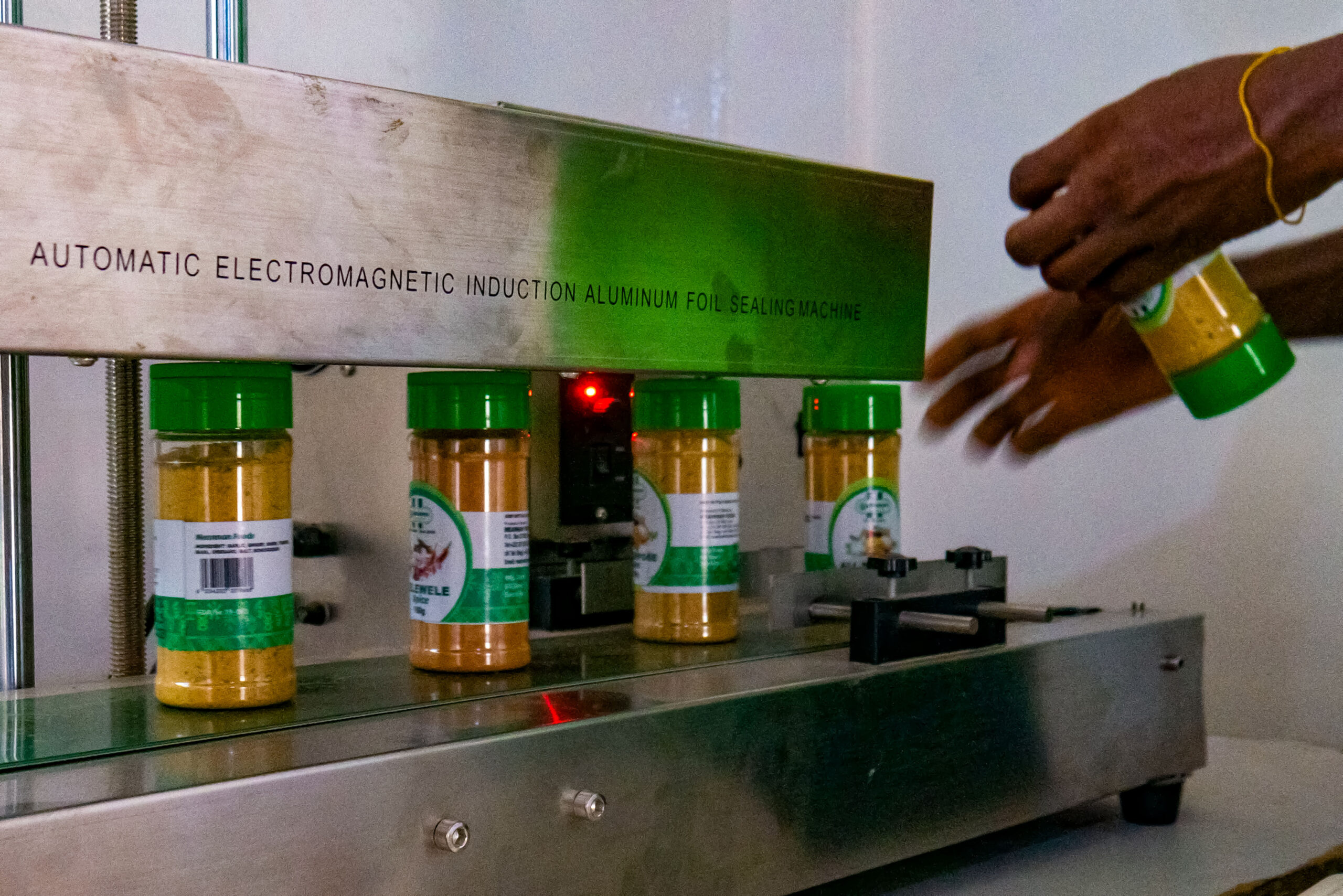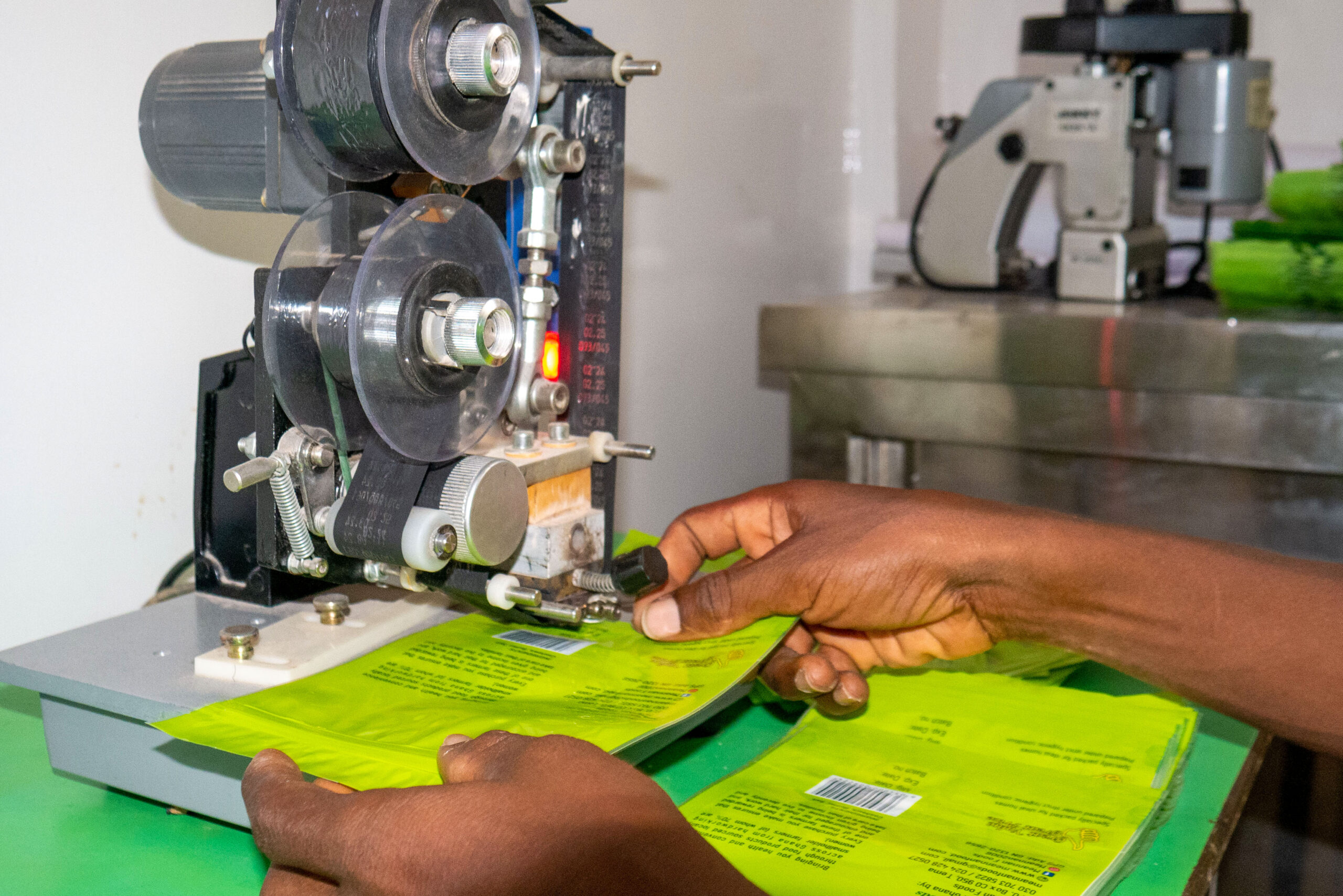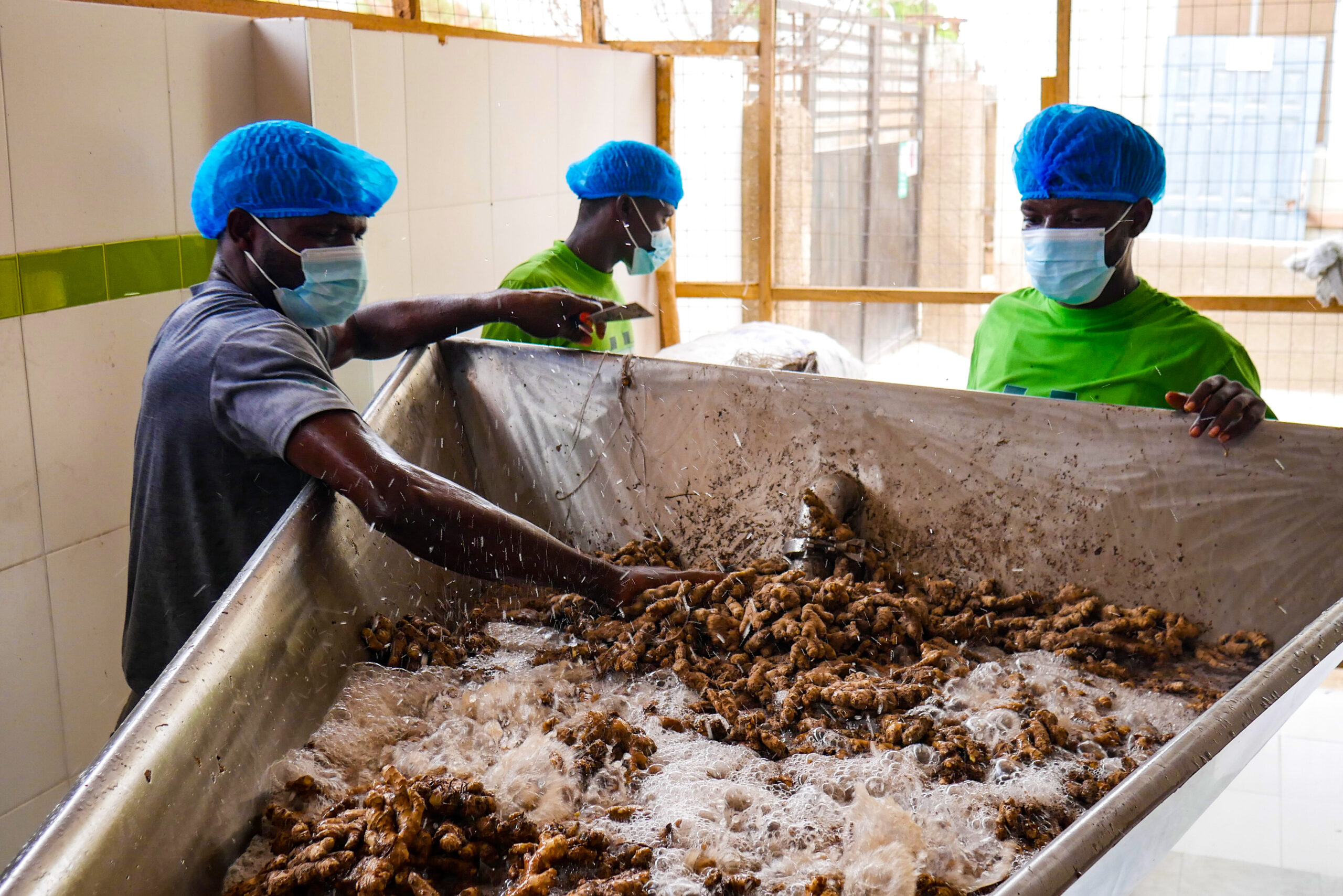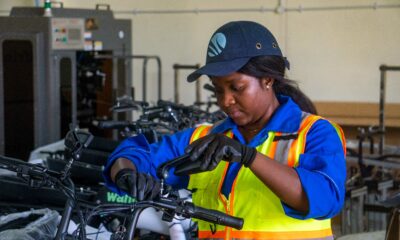Features
Charity Adubong is Preserving Traditional Ghanaian Foods with Innovative Techniques

Founder and CEO of Meannan Foods, Charity Adupong, holding some of the products. Photo: Richard Akakpo, Bird Story Agency
For years, Charity Adupong’s shopping experiences were marked with disappointment as she searched for nutritious local foods in major shopping malls and retail stores. The few that were on the shelves lacked attractive packaging.
Increasingly she realised that a huge opportunity existed in providing shoppers with well-packaged indigenous foods. She decided to tap into the growing demand.
“I have never liked the way our markets are structured so I used to shop from where I bought regular local foods like tomatoes, beans… as a young person who had just come to Tema as a National Service Personnel. On one of those occasions, I bought Agushie (melon seeds) and I thought that the packaging was not looking good so I decided that I could do something about it and felt that as young as I was I could do better than what they had at the shop,” Adupong explained, as she moves around one of three different factory facilities she now runs.
Only in her early 20s at the time and part of a family supported by a single mother, Adupong took matters into her own hands.
“I went to the shop manager and told him what I could offer him and he agreed and asked me to bring a sample. The other aspect is that I was struggling in terms of finances and taking care of myself. My mother has been supportive but… I thought I was burdening her and so I wanted to do something to support myself,” she said.
“Fortunately for me, I was working in a company where I had known a few graphic designers. I approached one of them with the concept and he designed a very nice label for me, did the sample, sent it to the shop and the rest is history,” she said, making it all sound easy. But as with the entrepreneurial journeys of many young African women, the journey was anything but easy.
After getting the green light from ShopRite to supply them with her products, she started raising funds by saving. She proceeded to register her business and moved to certify her products with the Ghana Standards Authority, Food Research Institute and the Food and Drugs Authority where she also received training and capacity building.

Packaging of products at Meannan Foods in Afienya-Mataheko. Photo: Richard Akakpo, Bird Story Agency
“My natural ability came in terms of the final outlook of the products. I learn, I apply and I also add the physical.”
With just 15 cedis (about US$1.2) to her name, she rented a shop.
“It started from my living room/kitchen and then after a few months, I realised it needed more of my attention. I was not ready to quit my job so I found a place closer to my workplace so that I could run in at lunchtime and even in the morning before I got to work and after work before I go home.”
Luckily, Adupong had some experience in business before she started what today is Meannan Foods. She had started out buying and selling second-hand clothes and anything she could lay her hands on. She wanted to attend fashion school but that dream was truncated due to the cost.
“It was expensive so I thought about something that could be simple and not require a lot of capital to start and move to fashion later but here I am today.”
As she moves around her factory inspecting dried cassava chips spread on racks and neatly covered with blue nets it is clear that her sense of aesthetic extends beyond the packaging on her product labels. The factory where she checks on the employees’ sorting and roasting grains, inspects huge sacks of ginger stocks and the washing area as well as the electric dryer and packaging area before moving to her executive office for an update from her staff, is all neat as a pin.
The name “Meannan” came from Adupong’s indigenous name and maiden surname and the company has become known for the face-lifts it has given to Ghanaian indigenous foods. The facilities are located in Afienya-Mataheko near Tema in the Ningo-Prampram District of the Greater Accra Region.
From her first small steps, CEO and Founder “Maame Ekua Annan” started seeing real growth after winning a grant in 2015, on top of previous loans from the bank. The win coincided with Adupong quitting her job to focus on Meannan Foods full-time.

An employee branding packages at Meannan Foods. Photo: Richard Akakpo, Bird Story Agency
“I heard about a business plan competition and applied for it and went through. They awarded 13 people and fortunately, I was among the first three people who had higher amounts. I had £6,000 at the time and that boosted my confidence in trying to raise funds. But before then, I had taken a loan from my bankers twice after some time,” she explained.
Meannan Foods’ range of products extends from cassava powder, prekese (aidan fruit) powder, ginger powder, Gari, and onion powder to corn grits, with the biggest seller being tombrown – a cereal-based porridge with high protein content and affordable.
“Our target is children suffering from malnutrition and low-income earners who cannot afford high-priced protein so our porridges are soya-based to help fight malnutrition in children and also to make it very affordable for parents… We have various varieties of tombrowm. We have millet-based, corn-based and wheat-based. A 500-gram-pack of the Tombrown for 12 cedis (about US$0.94),” she explained.
Feedback from customers encourages Adupong and her team to do more.
“In 2017, I was in London for an award and took some of the products there and shared them with participants who came to the conference and I kept hearing ‘your products look so good. It doesn’t look like it was coming from Ghana.’ This was something I used to hear in Ghana so going there and hearing it also was very encouraging. It gives me the energy to do more,” she said.
Currently with 33 employees, the company’s strategic location in Afienya-Mataheko of the Ningo-Prampram District of the Greater Accra Region helps in sourcing raw materials from different parts of the country for timely deliveries.

Employees washing ginger grits at Meannan Foods in Afienya-Mataheko. Photo: Richard Akakpo, Bird Story Agency
Adupong had challenges with constant supplies of raw materials at her previous location which led to her moving her facilities to their current locations to have easy access to farms and buy the majority of the fresh produce at the farm gates.
”I have farmers all around me here, most of the raw materials are just 15 minutes and 30 minutes away so sometimes we go and cart ourselves.”
“The ones that come from afar are not too far. Some are from the Volta and Eastern Regions. So we are well-positioned to receive raw materials which is a major challenge for food processing companies. The other thing is profiling farmers. We have hundreds of smallholder farmers that we profile so that when their produce is ready, they have a ready market,” she said.
Quitting her job to focus on Meannan Foods has paid off for Adupong. She has since also won several local and international awards, including the Global Women Innovators “for the work done with our porridges on fighting malnutrition in children.
Adupong wants Meannan to become a household name and for local foods to be just as attractive as imported food on shelves.
Her products are currently found in different branches of ShopRite, Melcom and other retail shops in and out of the Greater Accra Region.
“Products like prekese, dawadawa powder, if you see how they’re done, you may not want to eat them…, but now they come in very nice packaging and we have improved it a lot…” she said.
Joyce Odefo Appiah is the founder of Ecomog Supermarket in Haatso, Accra, which stocks Meannan products. Her shop looked very attractive with packaged foods but said a good number of them are imported due to the preferences of her customers.
Appiah believes that serious attention should be paid to making local packaged foods attractive like the innovation Adupong is putting in her products to attract bigger shopping malls like the ShopRites and others.
“For retail shops to support made-in-Ghana food products to increase growth, the quality needs to meet modern standards. People are busy these days so they’re always looking for convenient methods of cooking and eating nutritious foods,” Appiah said.
“It feels good to have locally-made products among my stocks,” she added.

Employees sorting corn grits at Meannan Foods. Photo: Richard Akakpo, Bird Story Agency
Dr. Elisha Ekow Obuom-Sakyi, a local Food Packing and Quality Expert who served as a consultant for several companies in the processing ecosystem, believes identifying entrepreneurs like Adupong with innovative ideas to equip them with tools and networks can help to overcome barriers to growth and improve competitiveness, leading to increases in local food packaging and job creation.
“The food processing industry can impact economic growth by bringing new products to the market through value addition to the numerous natural agro resources that we have. The introduction of new food produce and processing technologies will create new market opportunities, create jobs and can also attract investors in our economy and reduce the pressure on our local currency,” Obuom-Sakyi said.
He suggested a tailor-made scholarship system, whereby people with excellent ideas and innovative projects are awarded to be trained and come back to impact the economy.
Adupong believes the bigger picture for entrepreneurs in the food processing sector lies right in Ghana, especially being a rapidly growing middle-income country experiencing diet changes.
“We have had our challenges; things fell out of place due to COVID-19 impacts but last year (2023) was great. Our revenue increased by 45%.”
Being a mother and woman whose journey was diverted due to financial struggles, gender played a role in the success of her food business.
“Naturally in our culture, it’s women who cook and run the home so it’s easy for me to know what works and what doesn’t work. That’s to my advantage. I know a few men in the business who come to me for ideas anytime they want to develop a product,” Adupong said.
She has over the years invested in state-of-the-art machines and technology in every step of the company’s production to ensure world-standard packaging that can compete with imported products.
For Adupong, an increase in demand for locally packaged foods translates to real-time growth in the economy, job creation and the path to economic freedom for families.
“The workers here have at least one dependent and some at least four and they all support their families with the income they get from Meannan Foods. We have a capacity of about a tonne to three tonnes per day. But depending on the market demand we can do 500 kilograms to about a tonne depending on the product,” she said.
Story credit: Sefakor Fekpe for Bird Story Agency


















